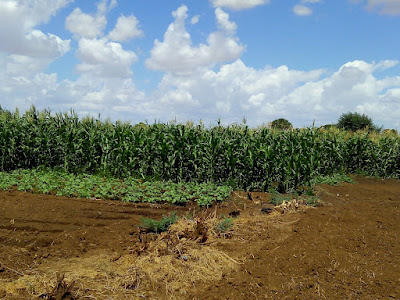A woman bagging charcoal for market.
It's easy money. When you have a family to feed, what are a few trees anyway?
Charcoal burning is common practice across Kenya. From cities slums to rural villages, people use charcoal as a ready fuel for jiko stoves and small fires to boil water and cook their food.
In Northeastern Kenya, it is common to see families chopping down Acacia trees and saplings to feed smoldering earthen mounds built to make charcoal. On the long drive from Nairobi to Garissa, you pass dozens of roadside stands selling tall feed sacks bulging with the charred wood made by desperate families.
The practice has led to mass deforestation and soil erosion throughout Kenya. In the Northeast, the practice is threatening the very environment that people rely on.
Over the past six years, our Canadian Baptist Ministries' team has been helping communities address the issue of food insecurity through conservation agriculture. An important aspect of this is has been training and support in agroforestry. In Garissa we are helping farmers and entire villages develop tree nurseries and establish a culture that values and protects the trees that provide shade, soil stability, and nourishment for their communities.
Halima and her son, Mohamad, at her farm in Bulla Pamoja.
Over a year ago, in January of 2016, Halima and her family made charcoal for a living. Their days were spent gathering firewood to stoke the ever smoking furnaces of their charcoal mounds. Today her soot-stained land has been transformed.
Halima's farm near Bulla Pamoja.
"Halima is already reaping the fruits of her work," shared our colleague Geofrey Mwita. "In her farm she currently has, maize, cowpeas, green grams and tomatoes and water melons. Among them she is harvesting maize, cowpeas and green grams, with that she are able to get food for her family and surplus to sell. With farming she spends a few hours in the farm and get enough time to be with her family comparing with the charcoal burning business which took almost a whole day and she did not get enough time to be with her family."
The transition from charcoal to farming has not been easy. Halima and her fellow farmers have encountered several challenges. From the struggling with muddy irrigation canals to learning the methods and standards of conservation agriculture, Halima has to invest a great deal of energy. Furthermore, unlike charcoal burning, Halima's new farm is attracting some unwanted attention.
"As we see the farm growing, we need to keep it safe!" shared Halima, who has seen scavaging baboons and grazing hippos threaten her harvest. "I have to stay awake all hours of night with my sons to watch and guard our crops’’
Despite the challenges, Halima and her family are grateful for the opportunity to gain skills and knowledge, a water pump, and seeds. Each week, our colleagues William Wako and Geofrey Mwita visit Halima's village and spend a day in the fields with Halima and the twenty-five new farmers in her cooperative. Together they identify pest and diseases, troubleshoot, share, and pray for their farms and families.
Through this project, Halima's son Mohamed has committed to bringing his two children to start school this May at Bulla Pamoja village school that CBM has helped the village elders establish. Halima prays for a better future for her son and grandchildren.
William and Aaron at our recent CBM programming meeting in Nairobi
Please join us in praying for the work of CBM in Kenya and throughout Africa. We especially remember families like Halima's that are making major transitions. We pray for our colleagues embedded in these communities.




Praying daily.
ReplyDeleteGod bless you
very good work! did you know you can make charcoal from only the branches of trees - we offer a free training Wed. and Sat at our shop in Nanyuki town http://kenyacharcoal.blogspot.co.ke/2012/08/the-cookswell-branch-charcoal-method.html
ReplyDeletegood work! please see http://kenyacharcoal.blogspot.co.ke/2012/08/the-cookswell-branch-charcoal-method.html to learn about making charcoal from tree branches and twigs.
ReplyDelete